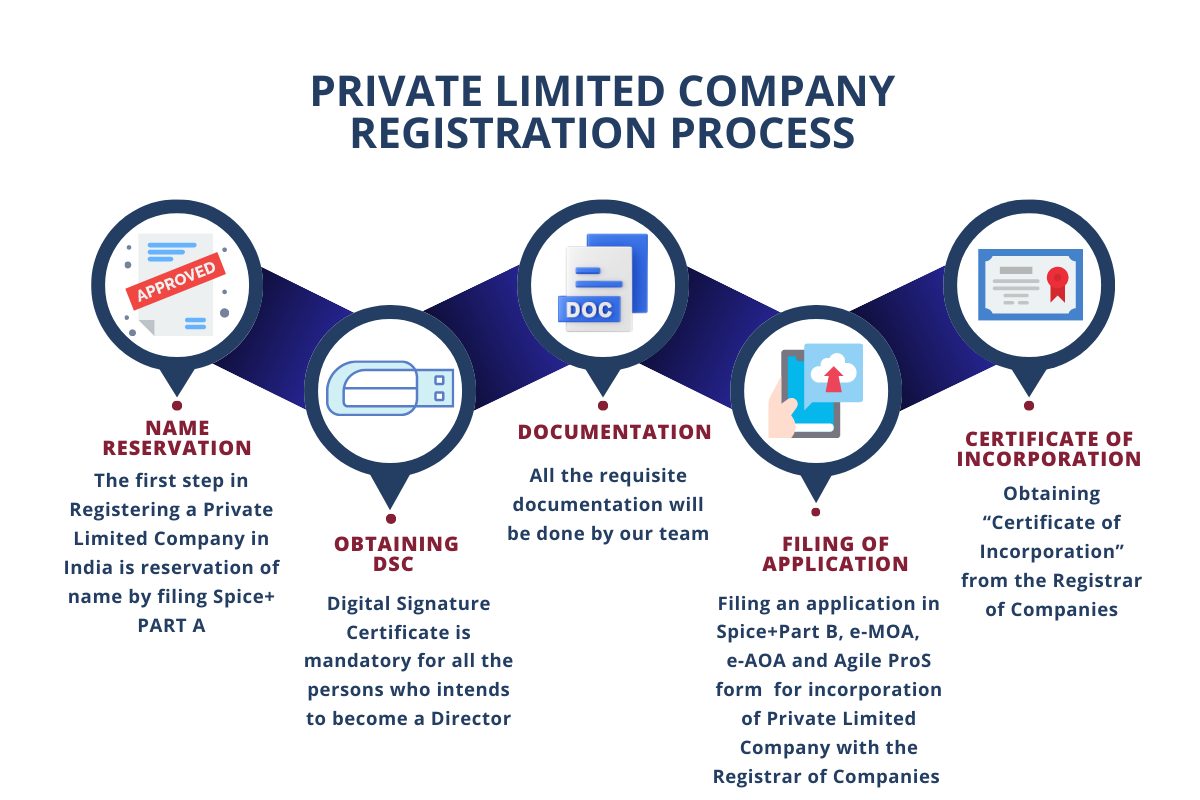Private Limited Company Registration in Mumbai
A Private Limited Company is a privately owned business entity formed for any lawful purpose under the provisions of the Companies Act, 2013 having minimum of two and maximum of two hundred members and the name of the company must end with the words ‘Private Limited’.
A company incorporated outside India seeking interest to start their operations in Mumbai, India as a start-up structure can incorporate a private limited company with substantially relaxed and lesser compliance regime as compared to a public limited Company.
Minuimum Requirements for Private Limited Company Registration in Mumbai
-
Minimum 2 shareholders
-
One of the Directors must be Indian Resident
-
DSC(Digital Signature Certificate) for two directors
-
Minimum 2 Directors
-
No Minimum Authorised Share Captial
-
The directors and the shareholders can be same person
-
DIN(Director Identification number) for 2 Directors

Documents Required for Private Limited Company Registration
- Copy of PAN (in case of resident); OR PAN Declaration (in case of Non Resident)
- Copy of Passport (in case of non-resident);
- Declaration in Form INC-9 for First Directors*
- Copy of proof of identity(Voters ID/Driving License/Passport);
- Copy of residential proof (Bank Statement/Telephone Bill/ Mobile Bill/ Gas Bill not older than 2 months);
- Consent to act as directors*;
- Disclosure of interest in other entities*;
From Directors
- Copy of Sale deed/ Property Deed (in case of owned property) or Lease Deed (in case of rented premises);
- Copy of Telephone or Mobile/Electricity or Gas Bill of registered office (Any one, not older than 2 months) ;
- No-objection Certificate from the owner of the premises for its use as registered office*;
- Memorandum and Articles of Association*
From Company
- Copy of PAN (in case of resident);
- Copy of Passport (in case of non-resident);
- Copy of proof of identity (Voter\'s ID/Driving License/Passport);
- Copy of residential proof (Bank Statement/ Telephone Bill/ Mobile Bill/Gas Bill not older than 2 months);
From Subscribers
Note 1: In case of foreign directors/subscribers, all the aforesaid documents should be notarized and apostilled or consularized. In case documents are not in english, translated copy in english should be notarized and apostiled or consularized. please read the attestation requirements of documents below in FAQs
Note 2: *Draft will be provided by our team
Note 3: Following additional documents will be required in case the subscriber of the company to be incorporated is another company: • Copy of resolution passed by the subscriber company; • Certificate of Incorporation of the Subscriber Company.
Advantages of a Private Limited Company Formation
Separate Legal entity
As a juristic legal person, both the company and its members have separate legal identity that is distinct from each other.
Perpetual Succession
A company existence is uninterrupted, even the death or insolvency of shareholder(s)/ directors cannot affect the continuity of business of the company.
Limited Liability
The liability of members of a private limited company is limited to the amount of share capital remaining unpaid on the shares held by them.
Easy transferability of ownership
The ownership in a private limited company is easily transferable by way of transfer of shares from one member to another subject to the restriction that the total number of members of a private limited company cannot exceed 200.
FDI Allowed
In Private Limited Comapny, 100% Foreign Direct Investment is allowed that means any foreign entity or foregin person can directly invest in a Private Limited Company.
Builds Cerdibility
The particulars of the company are the available on a public database. Which improves the cerdibility of the company as it makes it easy to authenticate the details.
Frequently Asked Questions
-
What is the Minimum and Maximum strength required to incorporate a private limited company?
For setting up a private limited company, minimum of 2 and maximum of 200 shareholders are required. In addition, a minimum of 2 and maximum of 15 directors can be appointed by any private limited company.
There is no restriction on a Member of a Private Limited Company to be a Director of the same company or vice versa.
-
Do I have to be present in person to incorporate a Private company?
No, you are not required to be present at our office or appear at any office for the incorporation of a Private Limited Company. All the documents can be scanned and sent through email and the original hard copy can be couriered to our office.
-
How long is the incorporation of the company valid for?
Once a Company is incorporated, it will be active and in-existence until you liquidate it either by striking-off or winding up.
-
Which sectors are prohibited by the Government for foreign investment?
Investment by person resident outside India is prohibited in certain sectors namely:
-
Lottery business including Government/ private lottery, online lotteries;
-
Gambling and betting including casinos;
-
Chit funds (except for investment made by NRIs and OCIs on a non- repatriation basis);
-
Nidhi company;
-
Trading in Transferable Development Rights (TDRs);
-
Real Estate Business or Construction of Farm Houses;
-
Manufacturing of cigars, cheroots, cigarillos and cigarettes, of tobacco or of tobacco substitutes. The prohibition is on manufacturing of the products mentioned and foreign investment in other activities relating to these products including wholesale cash and carry, retail trading etc. will be governed by the sectoral restrictions laid down in Regulation 16 of FEMA 20(R);
-
Activities/ sectors not open to private investment viz. atomic energy and railway operations;
-
Foreign technology collaboration in any form including licensing for franchise, trademark, brand name, management contract is also prohibited for Lottery business and Gambling and betting activities
-
-
Who all can be appointed as a Director of the private limited company?
The minor shall not be appointed as director of the company. He needs to be over 18 years of age and must be a natural person. Foreign nationals are also eligible to be a director in an Indian Private Limited Company provided that at least one of the director shall be resident of India.
-
Whether an office is required for starting a private limited company?
Yes, the office can be commercial / industrial / residential which is capable of receiving and acknowledging all communications and notices as may be addressed to it is required which can be shown as the registered office of the Company.
-
What do I need to quickly incorporate my company?
To incorporate a Company quickly, make sure the proposed name of the Company is very unique. Names that are similar to an existing company / limited liability partnership / trademark can be rejected and additional time will be required for re-submission of names.
-
What is Director Identification Number (DIN)?
DIN is a unique identification number assigned to all existing and proposed Directors of a Company. Before a person gets appointed as a Director, he must obtain a valid DIN. DIN never expires and a person can possess only one DIN.
-
Is it mandatory to obtain a PAN from the company?
Permanent Account Number (PAN) is a ten-digit alphanumeric number, issued by the Income Tax Department of India as a proof of identification for tax purposes. It is required for obtaining Digital Signature Certificate, opening bank accounts, various statutory registrations, to pay taxes and filing tax returns and many other transactions as prescribed by the government from time to time. It is mandatory for a company incorporated in India to obtain a PAN.
-
What is a Digital Signature Certificate?
A Digital Signature Certificate (DSC) establishes the identity of the signee electronically while filing documents. The Ministry of Corporate Affairs (MCA) mandates that e-form(s) submitted on the MCA portal are digitally signed using DSC.
-
Is it mandatory to obtain EPFO and ESIC registration of the company?
Yes. It is mandatory for all the new companies incorporated w.e.f 23rd February, 2020 to obtain EPFO and ESIC registration.
-
Is opening of bank account mandatory for all the companies?
Yes. All the new companies are required to apply for opening the company’s bank account through the Form AGILE PRO.
-
Is Registration for Professional Tax is mandatory all over India?
No. Registration for Professional Tax is mandatory only in respect of new companies incorporated in the State of Maharashtra w.e.f 23rd February 2020.
Download

Download Business Guide
This guide provides detailed information about the India Ecosystem, tax structure, major compliance etc. It helps entrepreneurs understand how to start and grow their business in India.

